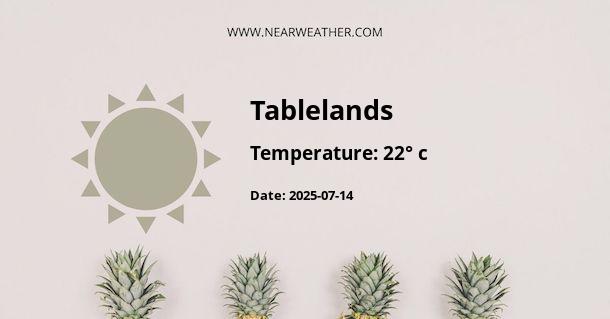Climate and Weather in Tablelands, AU
Located in the northeastern part of Queensland, Australia, the Tablelands region experiences a unique and varied climate throughout the year. From tropical temperatures to cooler mountain climates, this area offers a diverse range of weather patterns that attract visitors and residents alike. Understanding the climate and weather in Tablelands is essential for anyone planning a visit or considering relocating to this picturesque region.
Seasonal Overview
The Tablelands region experiences distinct wet and dry seasons, characteristic of tropical and subtropical climates. The wet season typically occurs from November to April, bringing higher temperatures and significant rainfall, while the dry season runs from May to October, with cooler temperatures and lower humidity levels. Understanding the specific weather patterns within each season is crucial for planning activities and preparing for any potential climate-related challenges.
Temperature and Precipitation
Throughout the year, Tablelands experiences a considerable temperature variation between the wet and dry seasons. During the wet season, average temperatures range from 24°C (75°F) to 31°C (88°F), with high humidity levels. In contrast, the dry season brings cooler temperatures, with averages ranging from 14°C (57°F) to 25°C (77°F). This seasonal temperature difference creates distinct experiences for locals and visitors, allowing for a range of activities and outdoor pursuits.
As for precipitation, the wet season brings the majority of Tablelands' annual rainfall, with an average of 1000mm to 1200mm falling during this period. Conversely, the dry season sees significantly lower rainfall levels, with an average of 40mm to 60mm per month. This variation in precipitation directly influences the region's landscape, vegetation, and agricultural practices, making it a key factor in the local economy and lifestyle.
Extreme Weather Events
Like many regions with tropical and subtropical climates, Tablelands is susceptible to extreme weather events such as cyclones and heavy storms, particularly during the wet season. While these events are relatively rare, they can have a significant impact on the local community and infrastructure. Understanding the potential for these occurrences is crucial for residents and businesses to prepare and mitigate risks associated with such weather phenomena.
Climate-Related Activities and Tourism
The diverse climate of the Tablelands region provides ample opportunities for outdoor activities and tourism throughout the year. From exploring lush rainforests and waterfalls during the wet season to enjoying cooler temperatures for hiking and wildlife spotting during the dry season, the region offers something for all nature enthusiasts. Additionally, agricultural tourism thrives in this climate, with opportunities to visit farms and experience the seasonal variations in crop production and harvest.
Conclusion
The climate and weather in Tablelands, AU, offer a unique and diverse experience for residents and visitors alike. With distinct wet and dry seasons, varying temperatures, and notable precipitation differences, this region presents a rich tapestry of climate-related experiences and opportunities. Understanding the nuances of Tablelands' climate is essential for anyone looking to engage with the region's natural beauty and lifestyle.
A - Tablelands's Latitude is -17.310410 & Longitude is 144.007156.
A - Weather in Tablelands is 31° today.
A - Climate Conditions in Tablelands shows scattered clouds today.
A - Humidity in Tablelands is 33% today.
A - Wind speed in Tablelands is 18.54 km/h, flowing at 39° wind direction. today.
